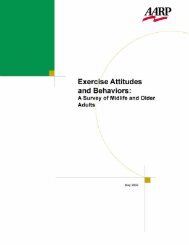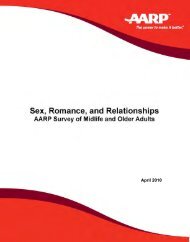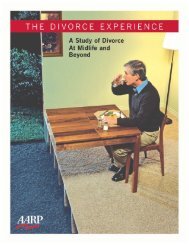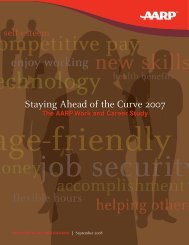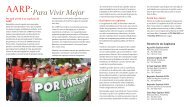The New Aging Enterprise - aarp
The New Aging Enterprise - aarp
The New Aging Enterprise - aarp
Create successful ePaper yourself
Turn your PDF publications into a flip-book with our unique Google optimized e-Paper software.
arrier for workers over age 50 who want to continue working. We know that the labor market<br />
is already experiencing a decline in the number of skilled workers able to fill the place of the<br />
growing number of people reaching retirement age. 80 Yet, the Towers Perrin confirmed that<br />
older workers still face an unwelcoming environment. In the G7 countries, these workers say<br />
that they want to continue working, on average, for five additional years, a prospect which would<br />
have a favorable effect in compensating for the declining global workforce.<br />
<strong>The</strong> Towers Perrin study concluded that worklife extension will be necessary because<br />
neither immigration nor productivity gains, by themselves, will be sufficient to offset the<br />
anticipated decline in numbers of skilled workers. <strong>The</strong>se trends point to an enlarged role for<br />
innovative organizations such as RetirementJobs or Idealist. But, despite these favorable trends,<br />
and, despite the proliferation of other computerized job-matching services, older workers will not<br />
find opportunities for productivity unless age discrimination is ended. To do that will require<br />
changes in both attitudes and in public policy, for example, strong legal enforcement of<br />
regulations prohibiting age discrimination. What we see here is, once again, the complementary<br />
role of public policy and the private marketplace. Without a more stringent regulatory<br />
environment, the market alone—in this case, computerized job-matching—will not solve the<br />
problem of opening up opportunities for productive aging for the growing numbers of older<br />
people who want longer work lives.<br />
Policy Perspectives. In 2005, Senator Herbert Kohl (D-Minn.) introduced a bill, which<br />
quickly received bipartisan co-sponsorship, to give employers a tax credit for establishing<br />
flexible work schedules that enable older employees to stay on the job without losing health care<br />
or pension benefits. In addition, the bill would give older workers more access to job training<br />
and COBRA supplemental health insurance and establish a national clearinghouse for<br />
information on hiring and retaining older workers. In promoting this legislation, sponsors<br />
emphasized that most older workers expect to work past traditional retirement age but would<br />
prefer flexible and phased work not currently offered by employers. As a result, many older<br />
workers would like to stay in the work force longer if they were offered such opportunities, a<br />
“win-win” situation for individuals and society.<br />
Other older workers will need retraining in order to remain productive. <strong>The</strong> IRS tax code<br />
currently allows deduction only for costs for maintaining skills in the same field, but the tax code<br />
could be amended to provide incentives for retraining in new careers at the point of retirement.<br />
A policy change along these lines has been recommended as a strategy for helping American<br />
workers succeed in a global economy but it could equally well apply for an aging work force. 81<br />
Some individuals have begun financing such later life retraining through so-called 529 collegesavings<br />
accounts (after the section of the IRS code authorizing them). <strong>The</strong> Council for Adult and<br />
Experiential Learning (CAEL) has developed its own model, Lifelong Learning Accounts<br />
(LiLAs), now tested in Illinois, Indiana and California. A pilot program in San Francisco<br />
specifically supports workers 55+ who are seeking new careers, and this initiative could be a<br />
basis for federal legislation.<br />
26



